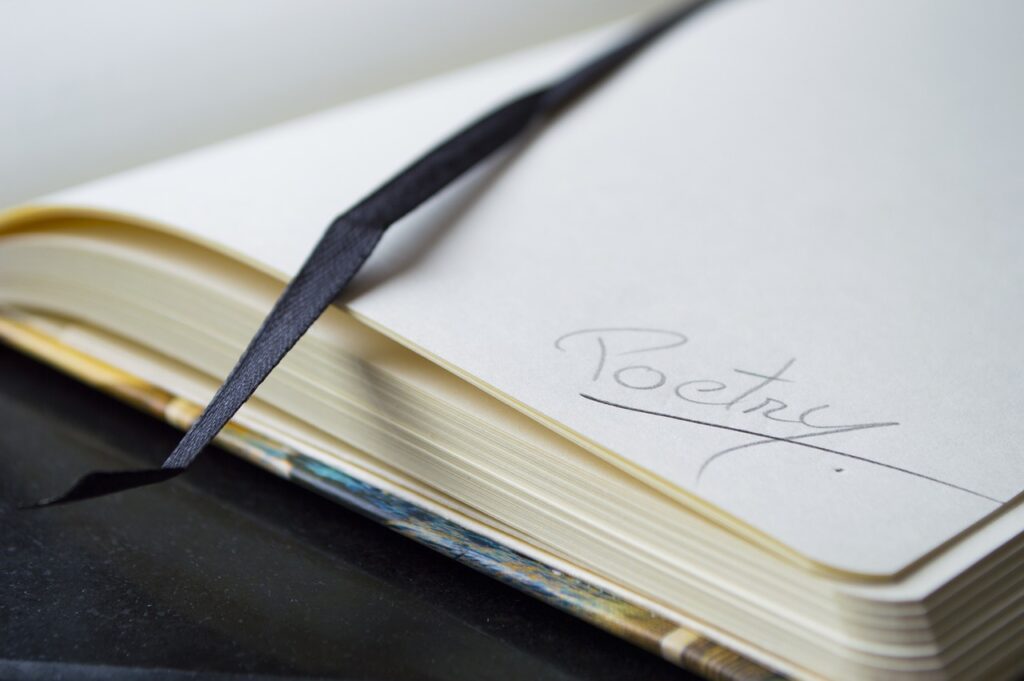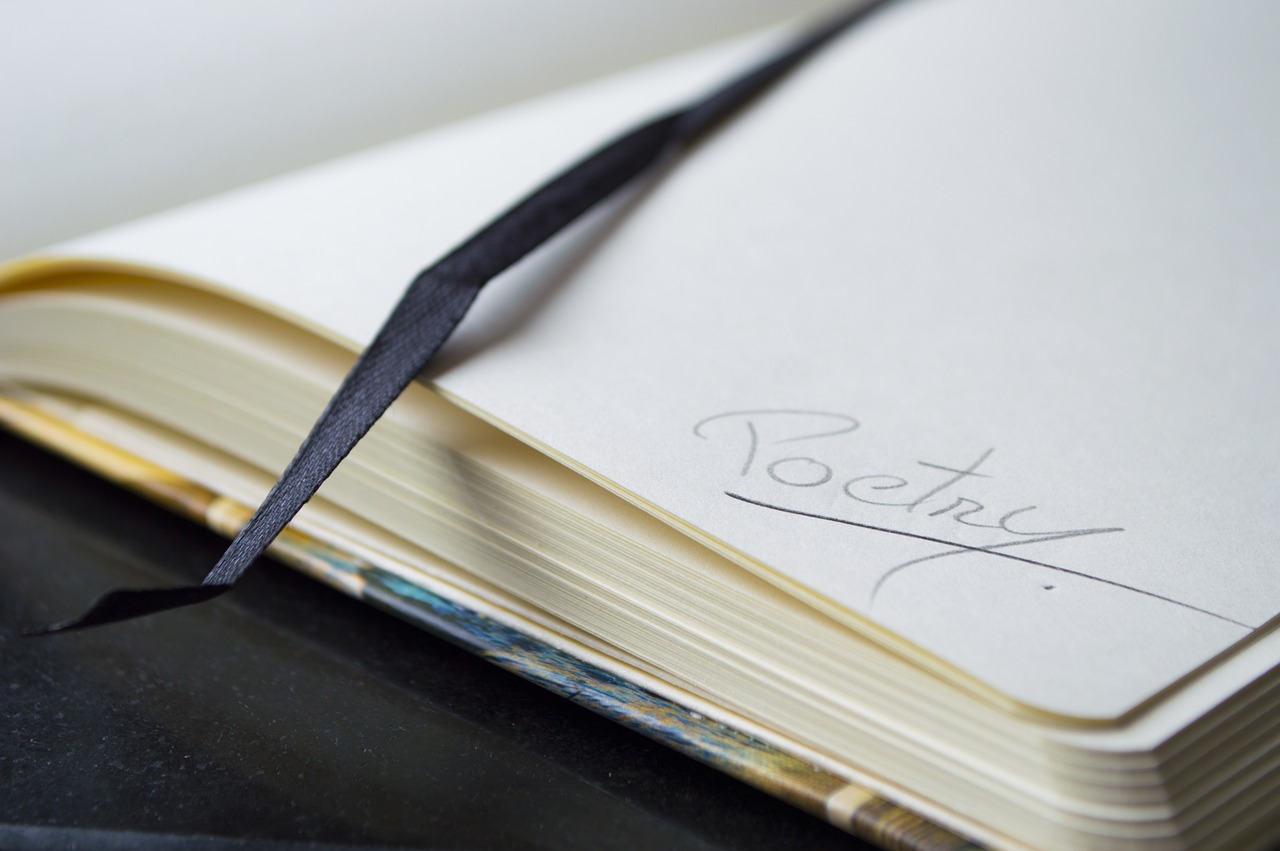What is poetry? Put simply, poetry is a form of creative writing which includes repetitive sounds that appeal to the listener and relies on minimal word choice. Even more simply–it sounds nice when read aloud and what it says, it does in as few words as possible.
Literary definition
A more complex or all inclusive definition from a literary terms resource is “Poetry is a type of literature based on the interplay of words and rhythm. It often employs rhyme and meter (a set of rules governing the number and arrangement of syllables in each line). In poetry, words are strung together to form sounds, images, and ideas that might be too complex or abstract to describe directly.”1 While this definition includes the necessities of form and the elements that are most often included in a poem, it’s not the one a poet would offer you. Those who write poems define poetry based on the result. That result could be for the reader or even for the poet themselves.

Image by cromaconceptovisual from Pixabay
Definitions from three poets
Poets use verse to express emotions, highlight human experiences, document the existence of something alive or inanimate, to tell a story in a unique way, and for countless other purposes. It makes sense then that they would define its use based on how they see the purpose of writing it at all. I’ve chosen definitions from three poets to include as examples. All three have unique takes on what poetry is. Each of these writers also writes in styles very different from each other. If you’d like to explore those styles, just click the links in their names to read some of their poems.
Joy Harjo
For Native American writer Joy Harjo, poetry is a way to document life. It can offer the next generation a guide to living and remembering. Her definition also includes room for growth and change.
“It is poetry that holds the songs of becoming, of change, of dreaming, and it is poetry we turn to when we travel those places of transformation, like birth, coming of age, marriage, accomplishments, and death. We sing our children, grandchildren, great-grandchildren: our human experience in time, into and through existence.”2
Gary Soto
Gary Soto (Mexican American writer) believes that poetry offers the unexpected. It takes readers off guard by showing them just how amazing a typical moment can become a memorable one if the poet includes the right words. Even within his definition, he cannot help but to give us examples of this with metaphors and similes.
“Everyday we say simple things like, “Gee, look at this tan of mine.” Or: “I feel sort of sad.” But say you wrote something like: “Our faces were the color of pennies,” and “Our souls are broken like jars.” The language becomes interesting and perks up our spirits and imagination. This is what poetry means—language that surprises and keeps us on our toes.” 3
Ted Hughes
The British writer Ted Hughes sees poetry as a powerful instrument. It takes readers on a journeys to what they never deemed possible. But most importantly, it can offer a way of understanding a situation or experience so that it brings redemption or restoration to the soul–something only a god could ever grant to the seeker.
“Poetry is the voice of spirit and imagination and all that is potential, as well as of the healing benevolence that used to be the privilege of the gods.”4
Fleeting moments
For me, poetry is about moments. These moments must be shared and documented because they are fleeting. I deem them as special because they have given me pause and stirred my imagination. My hope is that the reader will be pleasantly surprised by the simplicity of how a moment can mean so much more than it seems to on the surface. I demonstrate this in my poem, “A Creative So Brave,” that I wrote during the height of the pandemic. In this moment, I wanted to spend some time writing in a coffee house but was so afraid to do it. This episode in my world was unusual, and soon after it, the danger of being in public places had passed. But it was important to me that I marked this this event in my life because it was unlike any I’d ever experienced before or would again.
Be the poet
If you’ve ever thought about writing poetry, now is the time to try. It can be powerful for both you as the writer and for the audience who reads it. As you continue to write poems, you’ll notice that you too will have your own style and purpose for writing. If you’d like to get started, but aren’t sure how to begin, I’ve created a ten step method for writing poetry that could be just right for you. It’s called “Poetry Made Simple: From Idea to Poem in 10 Easy Steps.” Like the title says, I’ll take you from an idea to a completed poem with ease. I hope you’ll give yourself a chance to create your own definition of what poetry is and take that step toward writing your own poems.
- Poetry: What is poetry? Literary Terms. retrieved on January 20, 2025. https://literaryterms.net/poetry/ ↩︎
- Clancey D’Isa. Joy Harjo on the Power of Poetry, and on Building a Comprehensive Canon of Indigenous Poems. Chicago Review of Books. October 13, 2020, retrieved January 20, 2025. https://chireviewofbooks.com/2020/10/13/joy-harjo-on-the-power-of-poetry/ ↩︎
- Teaching Books. “In-depth Written Interview with Gary Soto.” August 29, 2007. retrieved on January 20, 2025. https://school.teachingbooks.net/interview.cgi?id=47&a=1 ↩︎
- The poetry archive. Ted Hughes. Retrieved on January 20, 2025. https://poetryarchive.org/poet/ted-hughes/ ↩︎
